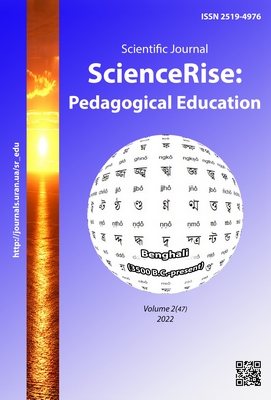Carpathian school: look to the future of non-formal education in Ukraine
DOI:
https://doi.org/10.15587/2519-4984.2022.255388Keywords:
university, non-formal education, sustainable development, the "third mission" of universities, climate change, waste management, biodiversityAbstract
Non-formal education is a social phenomenon that actively complements the traditional educational and scientific activities of classical educational universities. The "Third mission" of universities - education outside the classroom - is an actively developing movement in advanced countries, providing individuals with opportunities for self-development, self-realization, gaining new knowledge and practical experience. Understanding the "third" mission is an important component of success, as the social activities significantly increase the competitiveness of educational institutions in the educational services market. At this difficult time, when Ukrainian educational institutions are recovering from the Cowid-19 pandemic and Russian troops are deliberately destroying key civilian infrastructure, educators are gaining a unique opportunity to test new ways of transmitting knowledge, skills and attitudes. Non-formal education has an opportunity to implement multidisciplinary knowledge and skills directly in communities, shaping this way the values of a democratic society. This publication aims at assessing the achievements of the Carpathian School educational project and discussing ways to further develop multidisciplinary programs in response to the social demands of local communities.
The issues of non-formal education are extremely important for Ukraine, especially in martial law, when uncertainty in the formation of the social consciousness of citizens is exacerbated by global political, economic and environmental challenges.
The case study of the International Carpathian School gives the practice of organizing non-formal education. The Taras Shevchenko National University of Kyiv together with partner universities, NGOs and National Nature Parks, organized the School on the border of Ivano-Frankivsk and Chernivtsi regions, in the centre of the Hutsul land. The existing network of universities, strengthened by public organizations, government and business institutions, has good prospects for establishing educational programs to support sustainable development (SD) in the Carpathian region. Authors state that non-formal education has effective tools for the formation of worldview principles of the XXI century, professional orientation and socially responsible social behaviour of the young generation
References
- Belan, G. (2013). Education for sustainable development. Theory and practice of social systems management, 2. Available at: http://tipus.khpi.edu.ua/issue/view/2574
- Pro Tsili staloho rozvytku Ukrainy na period do 2030 roku (2019). Ukaz Prezydenta Ukrainy No. 722/2019. 30.09.2019. Available at: https://zakon.rada.gov.ua/laws/show/722/2019#Text
- Education 2030: Incheon Declaration and Framework for Action for the Implementation of Sustainable Development Goal 4 (2015). UNESCO. Available at: http://uis.unesco.org/sites/default/files/documents/education-2030-incheon-framework-for-action-implementation-of-sdg4-2016-en_2.pdf
- Khmelevska, О. М. (2018). Education for sustainable development: content and institutions Demography and Social Economy, 1 (32), 29–42. doi: http://doi.org/10.15407/dse2018.01.029
- Van Poeck, K., Lysgaard, J. A. (2015). The roots and routes of environmental and sustainability education policy research. Environmental Education Research, 22 (3), 305–318. doi: http://doi.org/10.1080/13504622.2015.1108393
- Lozano, R., Barreiro-Gen, M. (2019). Analysing the factors affecting the incorporation of sustainable development into European Higher Education Institutions' curricula. Sustainable Development, 27 (5), 965–975. doi: http://doi.org/10.1002/sd.1987
- Kopnina, H. (2011). Revisiting Education for Sustainable Development (ESD): Examining Anthropocentric Bias Through the Transition of Environmental Education to ESD. Sustainable Development, 22 (2), 73–83. doi: http://doi.org/10.1002/sd.529
- Agbedahin, A. V. (2019). Sustainable development, Education for Sustainable Development, and the 2030 Agenda for Sustainable Development: Emergence, efficacy, eminence, and future. Sustainable Development, 27 (4), 669–680. doi: http://doi.org/10.1002/sd.1931
- Mykhaylenko, V., Blyzniuk, M. (2021). Educational activities of the international Carpathian school in the context of sustainable development goals. ScienceRise: Pedagogical Education, 2 (41), 4–8. doi: http://doi.org/10.15587/2519-4984.2021.228131
- Bakhrushyn, V. (2016). Neformalna ta informalna osvita: navishcho vony nam potribni? Osvitnia polityka. Available at: http://education-ua.org/ua/articles/872-neformalna-ta-informalna-osvita-navishcho-voni-nam-potribni
- Pro zatverdzhennia poriadku vyznannia u vyshchii ta fakhovii peredvyshchii osviti rezultativ navchannia, zdobutykh shliakhom neformalnoi ta/abo informalnoi osvity (2022). Nakaz MON No. 130. 08.02.2022. Available at: https://mon.gov.ua/ua/npa/pro-zatverdzhennya-poryadku-viznannya-u-vishij-ta-fahovij-peredvishij-osviti-rezultativ-navchannya-zdobutih-shlyahom-noformalnoyi-taabo-informalnoyi-osviti
- Semyhina, T. V. (2020). European practice of professional qualifications validation on the basis of non-formal education. Scientific bulletin of South Ukrainian National Pedagogical University named after K. D. Ushynsky, 3 (132), 57–65. doi: http://doi.org/10.24195/2617-6688-2020-3-7
Downloads
Published
How to Cite
Issue
Section
License
Copyright (c) 2022 Valeriy Mykhaylenko, Mykola Blyzniuk

This work is licensed under a Creative Commons Attribution 4.0 International License.
Our journal abides by the Creative Commons CC BY copyright rights and permissions for open access journals.
Authors, who are published in this journal, agree to the following conditions:
1. The authors reserve the right to authorship of the work and pass the first publication right of this work to the journal under the terms of a Creative Commons CC BY, which allows others to freely distribute the published research with the obligatory reference to the authors of the original work and the first publication of the work in this journal.
2. The authors have the right to conclude separate supplement agreements that relate to non-exclusive work distribution in the form in which it has been published by the journal (for example, to upload the work to the online storage of the journal or publish it as part of a monograph), provided that the reference to the first publication of the work in this journal is included.







